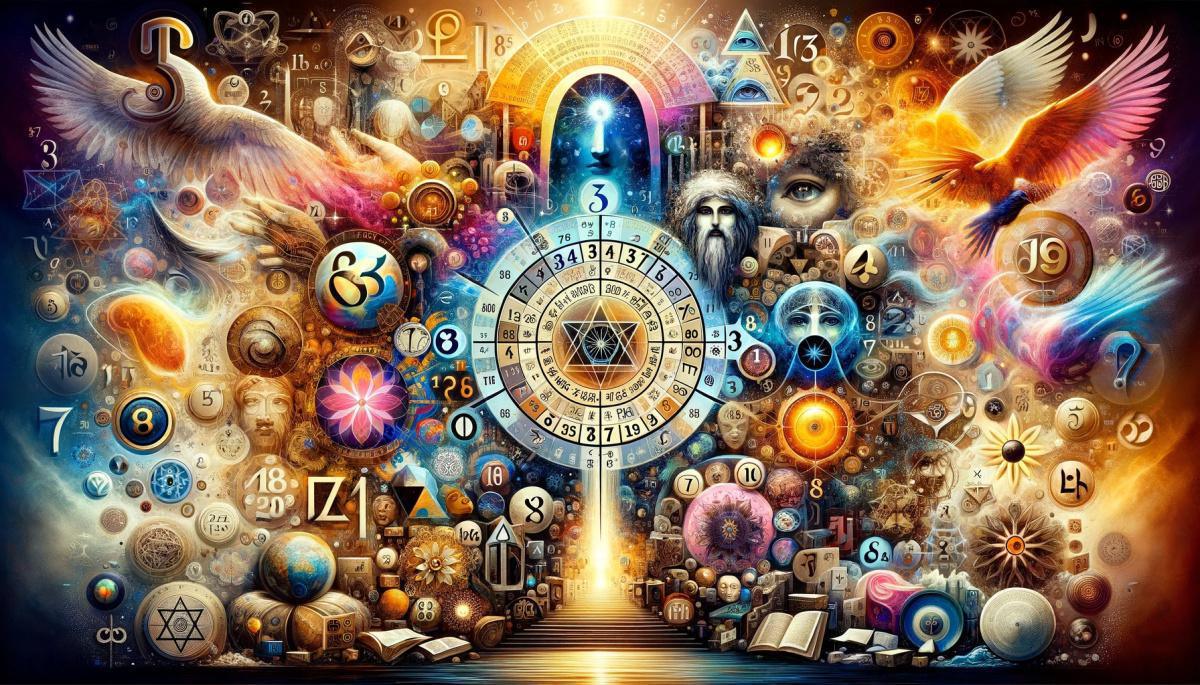In a world governed by the precision of mathematics and the certainty of numbers, there exists a parallel realm where numbers transcend their quantitative utility to assume a mystical and symbolic significance. This realm, explored through various practices like Gematria, Numerology, and Kabbalistic Numerology, delves into the profound relationship between numbers and the human experience, stretching across different cultures and historical epochs.
Importance of Numbers in Daily Life
Numbers are fundamental to our existence and daily life. From measuring time to conducting financial transactions, numbers are indispensable tools. They form the basis of our technological advancements and scientific discoveries. Without numbers, complex structures, precise engineering, and even basic commerce would be impossible. Numbers are not only practical tools but also carry symbolic and philosophical meanings, influencing our cultural and personal perceptions of the world.
Numbers are deeply embedded in our existence, shaping our understanding of the universe and ourselves. They are a universal language, transcending cultural and linguistic barriers, and are a testament to humanity’s quest for knowledge and understanding.
1. Gematria
Origins and Methods: Gematria, rooted in Jewish mysticism, particularly Kabbalah, uses numerical values assigned to Hebrew letters. Its primary method, the “absolute value” system, assigns fixed numerical values to each letter, allowing for the interpretation of words based on their cumulative numerical value.
Significance: Gematria offers profound insights into Hebrew scriptures. It’s believed that numerical analyses reveal deeper spiritual truths and divine connections, guiding interpretations of the Torah and other sacred texts.
2. Numerology
Universal Application and Methods: Numerology transcends cultural boundaries, providing personal insight and forecasting life events. The Pythagorean system, named after the Greek philosopher Pythagoras, is particularly popular in the Western world, attributing specific traits and destinies to numbers derived from personal data like birth dates and names.
Use in Divination: Through the analysis of personal numbers, numerology is often used for self-discovery, understanding personal dynamics, and predicting future trends.
3. Kabbalistic Numerology
Relationship with Gematria: While sharing roots with Gematria, Kabbalistic Numerology delves deeper into the mystical aspects of numbers within the Kabbalah. It’s used to gain spiritual insight and understand the universe’s divine nature.
Unique Aspects: Kabbalistic Numerology focuses on the soul’s journey and the esoteric meanings of numbers, often linked to the Tree of Life and other Kabbalistic symbols.
4. Chinese Numerology
Cultural Roots and Feng Shui: Integral to Chinese culture, Chinese Numerology emphasizes the philosophical and symbolic meanings of numbers. In Feng Shui, numbers determine the flow of energy (Qi) in an environment, impacting luck and well-being.
Symbolism in Philosophy: Each number holds a unique significance in Chinese philosophy, often connected to harmonious balance and life’s cyclical nature.
5. Pythagorean Numerology
Historical Background: Based on Pythagoras’s teachings, this system views numbers as the essence of life, emphasizing their harmonious relationships and vibrations.
Principles and Application: Pythagorean Numerology is utilized for personal growth, understanding life paths, and uncovering intrinsic qualities.
6. Chaldean Numerology
Ancient Mesopotamian Origins: Chaldean Numerology, stemming from ancient Mesopotamia, focuses on the vibrational properties of numbers.
Differences from Pythagorean Practices: Unlike Pythagorean Numerology, Chaldean Numerology emphasizes the deeper, often mystical, aspects of numbers, giving more weight to the number’s vibrations and less to the alphabetical order.
7. Indian Numerology (Vedic Numerology)
Vedic Connections: Rooted in ancient Indian Vedic teachings, this system integrates the concepts of Karma and Dharma.
Understanding Life’s Purpose: It uses numbers derived from personal data to guide individuals on their spiritual journey and life’s purpose.
8. Angel Numbers
New Age Concept: Angel Numbers involve interpreting recurring sequences as divine messages or guidance from angels.
Interpretation and Significance: Each sequence, such as 111 or 333, is believed to carry specific spiritual guidance, offering reassurance or direction in life.
9. Biblical Numerology
Symbolic Numbers in the Bible: This practice focuses on the occurrence and thematic use of numbers in the Bible, interpreting them as symbolic rather than literal.
Thematic Significance: Numbers like 7 (signifying completeness) and 12 (representing the tribes of Israel) are scrutinized for their deeper theological and prophetic meanings.
In conclusion, the study and interpretation of numbers across various mystical and cultural traditions, from Gematria and Numerology to Chaldean and Vedic systems, highlight a universal truth: numbers are more than mere symbols or tools for calculation. They are deeply embedded in the fabric of our spiritual, philosophical, and cultural landscapes.
Each system, whether it be the Kabbalistic interpretations of Jewish mysticism, the harmonious principles of Pythagorean Numerology, the life-guiding insights of Indian Numerology, or the divine messages believed to be conveyed through Angel Numbers, offers a unique perspective on how numbers relate to the human experience. They provide us with a means to explore the mysteries of the universe, understand our inner selves, and connect with deeper spiritual truths.
These diverse practices, despite their varied origins and methodologies, all share a common recognition of the profound significance of numbers. They acknowledge that numbers are not just quantitative values but hold symbolic power that can unlock insights into the nature of reality, our destiny, and the cosmic order.
This exploration into the mystical dimensions of numbers reveals a fascinating intersection of science, spirituality, and art. It underscores how numbers have been, and continue to be, a source of wonder, inspiration, and contemplation across civilizations and throughout history. In essence, the study of these numerological systems is a testament to the enduring human quest for understanding, meaning, and connection in an intricate and vast universe.

